
Precision Medicine Without Borders
Conference speaker bios are below in alphabetical order.
- Naomi Allen
- Krystal Birungi
- Allan Brandt
- Zhengming Chen
- Noa Dagan
- George Daley
- Maha Farhat
- Keolu Fox
- Garrett Frampton
- Jennifer Gardy
- Ashish Jha
- Elizabeth Karlson
- Isaac Kohane
- Marc Lipsitch
- Arjun Manrai
- Lili Milani
- Paisan Ruamviboonsuk
- Milind Tambe
Naomi Allen, DPhil, MSc
Chief Scientist, UK Biobank
Professor of Epidemiology, Population Health, University of Oxford
 Naomi Allen is Chief Scientist for UK Biobank and Professor of Epidemiology at the Nuffield Department of Population Health, University of Oxford, UK.
Naomi Allen is Chief Scientist for UK Biobank and Professor of Epidemiology at the Nuffield Department of Population Health, University of Oxford, UK.
Naomi joined the UK Biobank in 2011 as Senior Epidemiologist and in 2019 become Chief Scientist. She is responsible for co-ordinating the linkage of routine electronic health-related records into the study for long-term follow-up and for helping to define the scientific strategy for the introduction of new enhancements.
She has co-authored over 350 publications (scopus h-index: 99) and has a keen research interest in the role of diet, adiposity, hormones and other biomarkers on cancer risk using large-scale prospective cohort data.
Krystal Birungi
Field Entomology Coordinator, Target Malaria Uganda
Uganda Virus Research Institute
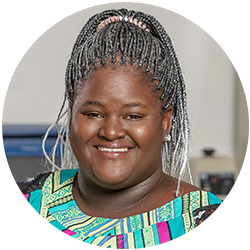 Krystal Mwesiga Birungi is the Field Entomology Coordinator for the Target Malaria Uganda project which is part of Target Malaria consortium based at the Uganda Virus Research Institute.
Krystal Mwesiga Birungi is the Field Entomology Coordinator for the Target Malaria Uganda project which is part of Target Malaria consortium based at the Uganda Virus Research Institute.
The Target Malaria consortium is a not-for-profit international research consortium that aims to develop new approaches for malaria vector control using gene drive, aiming at reducing the population of malaria-transmitting mosquitoes in sub-Saharan Africa.
For the past eight years, Krystal has been involved in research concerning An. gambiae s.l. populations in Uganda, mostly focusing on population dynamics, behavior and species composition of this complex across the country. She was a recipient of the Pan African Mosquito Control Association Women in Vector control excellence award in 2022.
Krystal is also the Country lead for PAMCA WiVC chapter in Uganda starting in 2023. Krystal holds a double major in Zoology and Botany from Makerere University. She is a speaker for the Global Fund Advocates Network and is passionate about reducing the malaria disease burden in Uganda and Africa as a whole.
Allan Brandt, PhD
Kass Professor of the History of Medicine, Harvard Medical School

Allan M. Brandt, PhD, is the Amalie Moses Kass Professor of the History of Medicine and Professor of the History of Science at Harvard University. Brandt holds a joint appointment there and at Harvard Medical School, where he recently served as the interim chair of the Department of Global Health and Social Medicine.
Brandt’s work focuses on twentieth-century social and ethical aspects of health, disease, medical practices, and global health. He is the author of No Magic Bullet: A Social History of Venereal Disease in the United States since 1880 (1987). His book The Cigarette Century: The Rise, Fall, and Deadly Persistence of the Product that Defined America received the Bancroft Prize in 2008 and the William H. Welch Medal in 2011.
Brandt has been elected to the National Academy of Medicine and the American Academy of Arts and Sciences. From 2019 to 2020, Brandt received fellowships from the American Council of Learned Societies and the Radcliffe Institute for Advanced Study. He is currently writing about the history and ethics of stigma and its impact on patients and health outcomes.
Zhengming Chen, DPhil, MBBS
PI, China Kadoorie Biobank
Richard Peto Professor of Epidemiology, Population Health, University of Oxford
 Professor Zhengming Chen is inaugural Richard Peto Chair in Epidemiolgy at the Nuffield Department of Population Health, University of Oxford. He qualified in medicine at Shanghai Medical University in 1983, followed by further postgraduate training in public Health in China and DPhil in Epidemiology at University of Oxford in 1991. His main research concerns causes, prevention and treatment of major chronic disease (e.g. IHD, stroke, diabetes, cancer) and development of precision medicine, using big data and genomics approaches. Over the last three decades, he has led several large randomised trials involving in total >100,000 patients, leading to major changes of international guidelines and clinical practice. In 2003, he initiated, designed and established in collaboration with research institutes in China, and has led even since as UK PI, the China Kadoorie Biobank (www.ckbiobank.org) of >512,000 adults, which will continue for the next 15-20 years. In Oxford he leads a large and expanding multi-disciplinary research team, with research themes covering many different areas. In 2022 he was elected as Fellow of Academia Europaea in recognition of his scientific achievements.
Professor Zhengming Chen is inaugural Richard Peto Chair in Epidemiolgy at the Nuffield Department of Population Health, University of Oxford. He qualified in medicine at Shanghai Medical University in 1983, followed by further postgraduate training in public Health in China and DPhil in Epidemiology at University of Oxford in 1991. His main research concerns causes, prevention and treatment of major chronic disease (e.g. IHD, stroke, diabetes, cancer) and development of precision medicine, using big data and genomics approaches. Over the last three decades, he has led several large randomised trials involving in total >100,000 patients, leading to major changes of international guidelines and clinical practice. In 2003, he initiated, designed and established in collaboration with research institutes in China, and has led even since as UK PI, the China Kadoorie Biobank (www.ckbiobank.org) of >512,000 adults, which will continue for the next 15-20 years. In Oxford he leads a large and expanding multi-disciplinary research team, with research themes covering many different areas. In 2022 he was elected as Fellow of Academia Europaea in recognition of his scientific achievements.
Noa Dagan, MD, PhD, MPH
Director of AI-driven Medicine, Clalit Innovation
Lecturer, Ben Gurion University
 Noa Dagan is a public health physician and researcher. She holds an MD and an MPH from the Hebrew University, and a Ph.D. in Computer Science from Ben-Gurion University. She completed her postdoc in the Department of Biomedical Informatics at Harvard Medical School.
Noa Dagan is a public health physician and researcher. She holds an MD and an MPH from the Hebrew University, and a Ph.D. in Computer Science from Ben-Gurion University. She completed her postdoc in the Department of Biomedical Informatics at Harvard Medical School.
Dr. Dagan heads the AI-driven Medicine Department at Clalit Innovation (Clalit is Israel's largest integrated healthcare organization, covering over 50% of the Israeli population). Her responsibilities include the development and implementation of digital healthcare solutions to promote preventive, proactive, and personalized medicine. She leads the entire lifecycle of AI-driven interventions, from conception, through machine-learning modeling, to implementation in medical practice.
Dr. Dagan is also the co-director of the Digital Health Lab at the department of Software and Information Systems Engineering at Ben-Gurion University. Her research focuses on prediction models, algorithmic fairness, and causal inference based on real-world data.
George Daley, MD, PhD
Dean of the Faculty of Medicine
Caroline Shields Walker Professor of Medicine
Harvard Medical School
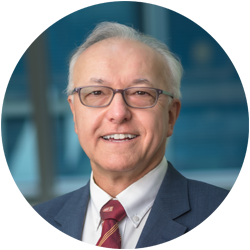 George Q. Daley, MD, PhD, is the dean of Harvard Medical School and the Caroline Shields Walker Professor of Medicine. A physician-scientist and an authority on stem cell science and cancer biology, his discoveries have twice been cited in Science magazine’s Top 10 Breakthroughs of the Year. He has co-authored international guidelines for the conduct and clinical translation of stem cell research and regenerative medicine and for ethical oversight of emerging biotechnologies. Daley’s priorities as dean of HMS include fostering innovative biomedical, computational and health care policy research, building a pipeline of novel therapeutics founded on basic science, nurturing the next generation of physician-scientists and advancing diversity in science, technology, engineering and medicine. Daley earned his AB and MD degrees from Harvard and a PhD in biology from MIT, and has worked as a trainee, fellow and staff physician at several HMS‐affiliated hospitals.
George Q. Daley, MD, PhD, is the dean of Harvard Medical School and the Caroline Shields Walker Professor of Medicine. A physician-scientist and an authority on stem cell science and cancer biology, his discoveries have twice been cited in Science magazine’s Top 10 Breakthroughs of the Year. He has co-authored international guidelines for the conduct and clinical translation of stem cell research and regenerative medicine and for ethical oversight of emerging biotechnologies. Daley’s priorities as dean of HMS include fostering innovative biomedical, computational and health care policy research, building a pipeline of novel therapeutics founded on basic science, nurturing the next generation of physician-scientists and advancing diversity in science, technology, engineering and medicine. Daley earned his AB and MD degrees from Harvard and a PhD in biology from MIT, and has worked as a trainee, fellow and staff physician at several HMS‐affiliated hospitals.
Maha Farhat, MD, MSc
Gilbert Omenn Associate Professor of Biomedical Informatics, Harvard Medical School
Associate Physician, Pulmonary & Critical Care Division, Massachusetts General Hospital
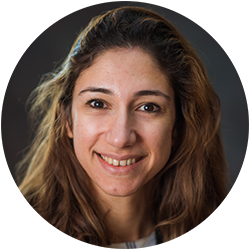 Maha Farhat is a physician scientist and completed her training at the McGill University Faculty of Medicine (2005), Massachusetts General Hospital (2012) and the Harvard Chan School of Public Health (2015). Dr. Farhat's research focuses on the development and application of methods for associating genotype and phenotype in infectious disease pathogens, with a strong emphasis on translation to better diagnostics and surveillance in resource-poor settings. To date, Farhat's work has focused on the pathogen Mycobacterium tuberculosis and spans the spectrum from computational analysis to field studies. She is PI and Co-Investigator on several projects funded by NIH including the NIAID and the BD2K initiative.
Maha Farhat is a physician scientist and completed her training at the McGill University Faculty of Medicine (2005), Massachusetts General Hospital (2012) and the Harvard Chan School of Public Health (2015). Dr. Farhat's research focuses on the development and application of methods for associating genotype and phenotype in infectious disease pathogens, with a strong emphasis on translation to better diagnostics and surveillance in resource-poor settings. To date, Farhat's work has focused on the pathogen Mycobacterium tuberculosis and spans the spectrum from computational analysis to field studies. She is PI and Co-Investigator on several projects funded by NIH including the NIAID and the BD2K initiative.
Keolu Fox, PhD
Assistant Professor, University of California San Diego
Co-founder, Native BioData Consortium
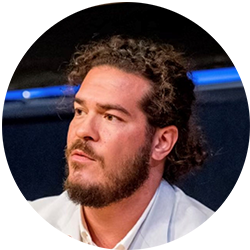 Keolu Fox, PhD is a co-founder of the NativeBioData Consortium (NBDC) and an Assistant Professor at the University of California, San Diego (UCSD), where he also co-founded and co-directs the Indigenous Futures Institute. He has extensive experience in designing and engineering genome sequencing and editing technologies and focuses on the connection between raw data and the value of genomic health data from Indigenous communities. As the first Kānaka Maoli to receive a doctorate in genome sciences, he has a decade of grassroots experience in advancing precision medicine with Indigenous partners.
Keolu Fox, PhD is a co-founder of the NativeBioData Consortium (NBDC) and an Assistant Professor at the University of California, San Diego (UCSD), where he also co-founded and co-directs the Indigenous Futures Institute. He has extensive experience in designing and engineering genome sequencing and editing technologies and focuses on the connection between raw data and the value of genomic health data from Indigenous communities. As the first Kānaka Maoli to receive a doctorate in genome sciences, he has a decade of grassroots experience in advancing precision medicine with Indigenous partners.
Garrett Frampton, PhD
Vice President, Computational Discovery, Foundation Medicine
 Garrett received a bachelor’s degree in Chemistry and in Biology from the University of Chicago. He received a PhD degree in Biology from the Massachusetts Institute of Technology, defending the thesis “Genomic analysis of control of cell type” in 2010. Prior to graduate school, he worked as a pharmacy technician, as a data manager in a psychopharmacology clinical research laboratory, and as a lab technician and data scientist in the genomics core facility at Boston University School of Medicine. For the last 13 years, Garrett has been a computational scientist and team leader at Foundation Medicine, a company that develops and operates cancer genomic profiling molecular diagnostics. He is currently Vice President, and lead of the Computational Discovery group within Research and Development at Foundation Medicine. This is a team of computational biology scientists tasked with conducting early-stage research on cancer genomics, computational pathology, and clinical outcomes for cancer patients. He has a long history of high impact scientific publications.
Garrett received a bachelor’s degree in Chemistry and in Biology from the University of Chicago. He received a PhD degree in Biology from the Massachusetts Institute of Technology, defending the thesis “Genomic analysis of control of cell type” in 2010. Prior to graduate school, he worked as a pharmacy technician, as a data manager in a psychopharmacology clinical research laboratory, and as a lab technician and data scientist in the genomics core facility at Boston University School of Medicine. For the last 13 years, Garrett has been a computational scientist and team leader at Foundation Medicine, a company that develops and operates cancer genomic profiling molecular diagnostics. He is currently Vice President, and lead of the Computational Discovery group within Research and Development at Foundation Medicine. This is a team of computational biology scientists tasked with conducting early-stage research on cancer genomics, computational pathology, and clinical outcomes for cancer patients. He has a long history of high impact scientific publications.
Jennifer Gardy, PhD
Deputy Director (Malaria), Bill & Melinda Gates Foundation
 Dr. Jennifer Gardy joined the Bill & Melinda Gates Foundation’s Malaria team as Deputy Director, Surveillance, Data, and Epidemiology in February 2019. Before that, she spent ten years at the BC Centre for Disease Control and the University of British Columbia’s School of Population and Public Health, where she held the Canada Research Chair in Public Health Genomics. Her research focused on the use of genomics as a tool to understand pathogen transmission, and incorporated techniques drawn from genomics, bioinformatics, modelling, information visualization, and the social sciences. In 2018, Jennifer was named one of BC’s Most Influential Women in STEM by BC Business Magazine and was named one of the Government of Canada’s 20 Women of Impact in STEM, and in 2021 she was elected to the National Academy of Medicine in recognition of her work on pathogen genomic epidemiology. In addition to her science work, Jennifer is also an award-winning science communicator, hosting many episodes of science documentary television, including The Nature of Things and Daily Planet, as well as authoring two science books for children.
Dr. Jennifer Gardy joined the Bill & Melinda Gates Foundation’s Malaria team as Deputy Director, Surveillance, Data, and Epidemiology in February 2019. Before that, she spent ten years at the BC Centre for Disease Control and the University of British Columbia’s School of Population and Public Health, where she held the Canada Research Chair in Public Health Genomics. Her research focused on the use of genomics as a tool to understand pathogen transmission, and incorporated techniques drawn from genomics, bioinformatics, modelling, information visualization, and the social sciences. In 2018, Jennifer was named one of BC’s Most Influential Women in STEM by BC Business Magazine and was named one of the Government of Canada’s 20 Women of Impact in STEM, and in 2021 she was elected to the National Academy of Medicine in recognition of her work on pathogen genomic epidemiology. In addition to her science work, Jennifer is also an award-winning science communicator, hosting many episodes of science documentary television, including The Nature of Things and Daily Planet, as well as authoring two science books for children.
Ashish Jha, MD, MPH
Dean, Brown University School of Public Health
Former White House COVID-19 Response Coordinator
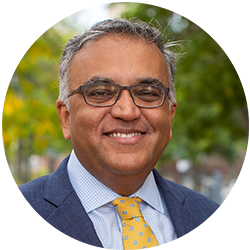 A global leader driving public health research, policy, and practice, Dr. Jha joined the Brown School of Public Health as Dean in September 2020.
A global leader driving public health research, policy, and practice, Dr. Jha joined the Brown School of Public Health as Dean in September 2020.
An accomplished and practicing physician, Dr. Jha is recognized globally as a trusted expert on major issues impacting public health, and a catalyst for new thinking and approaches. A long-time leader on pandemic preparedness and response, from directing groundbreaking research on Ebola to serving on the frontlines of the COVID-19 response, he has led national and international analysis of key issues and advised local and federal policy makers around the world.
President Joe Biden appointed Dr. Jha as White House COVID-19 Response Coordinator in March 2022, describing him as “one of the leading public health experts in America.” Dr. Jha led the work that increased the development of and access to treatments and newly formulated vaccines, dramatically improved testing and surveillance, facilitated major investments in Indoor Air Quality measures, and put in place an infrastructure to respond to current and future disease outbreaks more effectively.
Dr. Jha has published more than two hundred original research publications in prestigious journals such as the New England Journal of Medicine, JAMA and the BMJ, and is a frequent contributor to a range of public media. He has extensively researched how to improve the quality and reduce the cost of health care, focusing on the impact of public health policy nationally and around the globe. Dr. Jha is currently the Dean of the School of Public Health at Brown University. Before that, he was a faculty member at the Harvard T.H. Chan School of Public Health and Harvard Medical School since 2005. He was the Director of the Harvard Global Health Institute and also served as the Dean for Global Strategy at the Harvard T.H. Chan School of Public Health.
Elizabeth Karlson, MD
Professor of Medicine, Harvard Medical School
Rheumatologist & Epidemiologist, Brigham & Women’s Hospital
PI, Mass General Brigham Biobank
Co-PI, All of Us Research Program
 Dr. Elizabeth Karlson is a Professor of Medicine at Harvard Medical School, Scientific Director of Mass General Brigham (MGB) Personalized Medicine, and a rheumatologist and epidemiologist at Brigham and Women’s Hospital. Dr. Karlson has leadership roles in numerous multi-institutional research projects including eMERGE Clinical Center at MGB, the All of Us Research Program New England Consortium, and the Post-Acute Sequela of SARS-CoV2 Data Resource Core (PASC-DRC) and is Principal Investigator for the MGB Biobank. Dr. Karlson has expertise in longitudinal cohort studies, disease epidemiology and genetics, biobanking, and the use of bioinformatics to define phenotypes in the EHR.
Dr. Elizabeth Karlson is a Professor of Medicine at Harvard Medical School, Scientific Director of Mass General Brigham (MGB) Personalized Medicine, and a rheumatologist and epidemiologist at Brigham and Women’s Hospital. Dr. Karlson has leadership roles in numerous multi-institutional research projects including eMERGE Clinical Center at MGB, the All of Us Research Program New England Consortium, and the Post-Acute Sequela of SARS-CoV2 Data Resource Core (PASC-DRC) and is Principal Investigator for the MGB Biobank. Dr. Karlson has expertise in longitudinal cohort studies, disease epidemiology and genetics, biobanking, and the use of bioinformatics to define phenotypes in the EHR.
Isaac Kohane, MD, PhD
Professor & Chair, Biomedical Informatics, Harvard Medical School
Editor-in-Chief, NEJM AI
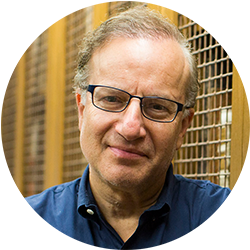 Isaac “Zak” Kohane, MD, PhD, is the inaugural chair of Harvard Medical School’s Department of Biomedical Informatics, whose mission is to develop the methods, tools, and infrastructure required for a new generation of scientists and care providers to move biomedicine rapidly forward by taking advantage of the insight and precision offered by big data. He served as co-author of the Institute of Medicine Report on Precision Medicine that has been the template for national efforts. Zak develops and applies computational techniques to address disease at multiple scales, from whole health care systems to the functional genomics of neurodevelopment. He also has worked on AI applications in medicine since the 1990’s, including automated ventilator control, pediatric growth monitoring, detection of domestic abuse, diagnosing autism from multimodal data and most recently assisting clinicians using whole genome sequence and clinical histories to diagnose rare or unknown disease patients.
Isaac “Zak” Kohane, MD, PhD, is the inaugural chair of Harvard Medical School’s Department of Biomedical Informatics, whose mission is to develop the methods, tools, and infrastructure required for a new generation of scientists and care providers to move biomedicine rapidly forward by taking advantage of the insight and precision offered by big data. He served as co-author of the Institute of Medicine Report on Precision Medicine that has been the template for national efforts. Zak develops and applies computational techniques to address disease at multiple scales, from whole health care systems to the functional genomics of neurodevelopment. He also has worked on AI applications in medicine since the 1990’s, including automated ventilator control, pediatric growth monitoring, detection of domestic abuse, diagnosing autism from multimodal data and most recently assisting clinicians using whole genome sequence and clinical histories to diagnose rare or unknown disease patients.
Over the last 30 years, Zak’s research agenda has been driven by the vision of what biomedical researchers could do to find new cures, provide new diagnoses and deliver the best care available if data could be converted more rapidly to knowledge and knowledge to practice. In so doing, Zak has designed and led multiple internationally adopted efforts to “instrument” the healthcare enterprise for discovery and to enable innovative decision-making tools to be applied to the point of care. At the same time, the new insights afforded by ’omic-scale molecular analyses have inspired him and his collaborators to work on re-characterizing and reclassifying diseases such as autism, rheumatoid arthritis and cancers. In many of these studies, the developmental trajectories of thousands of genes have been a powerful tool in unraveling complex diseases.
Zak has published over 500 papers in the medical literature and authored the widely-used books Microarrays for an Integrative Genomics (2003) and The AI Revolution in Medicine: GPT-4 and Beyond (2023). He is the inaugural Editor-in-Chief of NEJM AI and is committed to promoting the use of safe, unbiased, and efficacious AI applications to clinical medicine by setting the standard for rigorous and transparent clinical evaluations. A native of Geneva, Switzerland, Zak resides in Newton, Massachusetts and has a beautiful Belgian sheepdog to keep him company as his three children head off to college.
Marc Lipsitch, DPhil
Professor of Epidemiology, Harvard Chan School of Public Health
Director, Center for Communicable Disease Dynamics
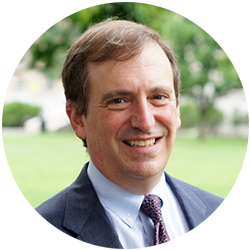 Dr. Lipsitch is Professor of Epidemiology at the Harvard University T. H. Chan School of Public Health. He directs the Center for Communicable Disease Dynamics and the Interdisciplinary Program on Infectious Disease Epidemiology. He is currently on part-time secondment to the US CDC as Senior Advisor for the newly established Center for Forecasting and Outbreak Analytics (though he speaks in this meeting in his academic/personal capacity). His research concerns the effect of naturally acquired host immunity, vaccine-induced immunity, and other public health interventions on the population biology of pathogens and the consequences for human health. He has authored over 350 peer-reviewed publications on antimicrobial resistance, epidemiologic methods, mathematical modeling of infectious disease transmission, pathogen population genomics, research ethics, and immunoepidemiology of Streptococcus pneumoniae. Dr. Lipsitch is a leader in research and scientific communication on COVID-19. Dr. Lipsitch received his BA in philosophy from Yale and his DPhil in zoology from Oxford. He did postdoctoral work at Emory University and CDC. He is a member of the American Academy of Microbiology and the National Academy of Medicine.
Dr. Lipsitch is Professor of Epidemiology at the Harvard University T. H. Chan School of Public Health. He directs the Center for Communicable Disease Dynamics and the Interdisciplinary Program on Infectious Disease Epidemiology. He is currently on part-time secondment to the US CDC as Senior Advisor for the newly established Center for Forecasting and Outbreak Analytics (though he speaks in this meeting in his academic/personal capacity). His research concerns the effect of naturally acquired host immunity, vaccine-induced immunity, and other public health interventions on the population biology of pathogens and the consequences for human health. He has authored over 350 peer-reviewed publications on antimicrobial resistance, epidemiologic methods, mathematical modeling of infectious disease transmission, pathogen population genomics, research ethics, and immunoepidemiology of Streptococcus pneumoniae. Dr. Lipsitch is a leader in research and scientific communication on COVID-19. Dr. Lipsitch received his BA in philosophy from Yale and his DPhil in zoology from Oxford. He did postdoctoral work at Emory University and CDC. He is a member of the American Academy of Microbiology and the National Academy of Medicine.
Arjun Manrai, PhD
Assistant Professor of Biomedical Informatics, Harvard Medical School
Deputy Editor, NEJM AI
 Arjun (Raj) Manrai, PhD is an Assistant Professor in the Department of Biomedical Informatics at Harvard Medical School, where he leads a research lab that works broadly on applying machine learning and statistical modeling to improve medical decision-making. Raj is also a founding Deputy Editor of NEJM AI, the new artificial intelligence-focused journal from the publishers of the New England Journal of Medicine, and co-host of the NEJM AI Grand Rounds podcast.
Arjun (Raj) Manrai, PhD is an Assistant Professor in the Department of Biomedical Informatics at Harvard Medical School, where he leads a research lab that works broadly on applying machine learning and statistical modeling to improve medical decision-making. Raj is also a founding Deputy Editor of NEJM AI, the new artificial intelligence-focused journal from the publishers of the New England Journal of Medicine, and co-host of the NEJM AI Grand Rounds podcast.
Focus areas for Raj’s research group include the clinical use of genomic data and blood laboratory biomarkers, inherited heart disease and kidney disease, decision making across populations, and reproducibility and safety challenges for medical artificial intelligence. His work has been published in the New England Journal of Medicine and JAMA, presented at the National Academy of Sciences, and featured in the New York Times, Wall Street Journal, and NPR.
Raj is also closely involved in the mentoring of students at Harvard College, having served for over a decade as a Resident Tutor and now member of the Senior Common Room of Leverett House. Students from the lab have won the Rhodes, PD Soros, and other awards to continue their training and research in machine learning and medicine.
Raj took the scenic route to medical AI, earning an AB in Physics from Harvard College followed by a PhD in Bioinformatics and Integrative Genomics from the Harvard-MIT Division of Health Sciences and Technology (HST).
He resides in the Boston area and outside work he can usually be found losing home dance competitions to his 2 young daughters.
Lili Milani, PhD
Professor of Pharmacogenomics, University of Tartu
Research Director, Estonian Genome Center
 Lili Milani is Head of the Estonian Genome Centre and Professor of Pharmacogenetics at the University of Tartu. She is also a senior advisor in pharmacogenomics at the Department of Genetics and Personalized Medicine, Tartu University Hospital. She is part of the core team behind the design and implementation of the national strategy for personalized medicine in Estonia in close collaboration with the Ministry of Social Affairs, the Institute for Health Development, and the Estonian Health Insurance Fund. The expectations for personalized medicine are very high in Estonia, and several implementation projects focusing on genomics for disease prevention have been launched in the national healthcare system during the last few years. Lili Milani earned her PhD degree in molecular medicine from Uppsala University, Sweden in 2009. Her main areas of research have been epigenetics, genomics of common diseases and pharmacogenomics. She is actively involved in research projects focusing on the genetics of mental health and cardiovascular co-morbidities, and the role of rare and common genetic variants in interindividual variability in drug response.
Lili Milani is Head of the Estonian Genome Centre and Professor of Pharmacogenetics at the University of Tartu. She is also a senior advisor in pharmacogenomics at the Department of Genetics and Personalized Medicine, Tartu University Hospital. She is part of the core team behind the design and implementation of the national strategy for personalized medicine in Estonia in close collaboration with the Ministry of Social Affairs, the Institute for Health Development, and the Estonian Health Insurance Fund. The expectations for personalized medicine are very high in Estonia, and several implementation projects focusing on genomics for disease prevention have been launched in the national healthcare system during the last few years. Lili Milani earned her PhD degree in molecular medicine from Uppsala University, Sweden in 2009. Her main areas of research have been epigenetics, genomics of common diseases and pharmacogenomics. She is actively involved in research projects focusing on the genetics of mental health and cardiovascular co-morbidities, and the role of rare and common genetic variants in interindividual variability in drug response.
Paisan Ruamviboonsuk, MD
Clinical Professor of Ophthalmology, College of Medicine, Rangsit University, Bangkok, Thailand
Dr. Paisan Ruamviboonsuk is a Clinical Professor of Department of Ophthalmology, College of Medicine, Rangsit University, Bangkok, Thailand. He is the former Presidents of the Royal College of Ophthalmologists of Thailand (2013-2016) and the Thai Retina Society (2011-2014).
He serves in many positions in ophthalmology societies in Asia-Pacific region, such as the Vice-President of Asia-Pacific Teleophthalmology Society, the Scientific Secretary of Asia-Pacific Vitreo-Retina Society, a Council Member of Asia-Pacific Academy of Ophthalmology, and the Secretary-General of Association of Southeast Asian Nations (ASEAN) Ophthalmology Society.
He received several distinguished national and international awards, such as the Chainat-Narenthorn Award, the most prestigious award for an officer in the Ministry of Public Health of Thailand, given by H.M. King Maha Vajiralongkorn, Rama X of Thailand, Asia-Pacific Academy of Ophthalmology Arthur Lim Award Lecturer, and American Academy of Ophthalmology Achievement Award.
Dr. Paisan have studied on screening for diabetic retinopathy, one of the leading causes of global blindness, using retinal photographs since the early 2000s. The screening has become a national program in Thailand. In 2022, he received Sasakawa Health Prize from the World Health Organization from his initiative on prevention of diabetic blindness in Thailand.
Milind Tambe, PhD
Professor, Harvard University Computer Science
Principal Scientist & Director, “AI for Social Good”, Google Research
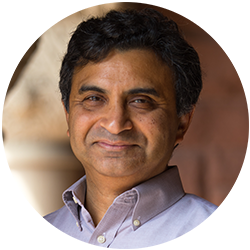 Milind Tambe is Gordon McKay Professor of Computer Science and Director of Center for Research in Computation and Society at Harvard University; concurrently, he is also Principal Scientist and Director for "AI for Social Good" at Google Research. He is recipient of the IJCAI (International Joint Conference on AI) John McCarthy Award, AAAI (Association for Advancement of AI) Feigenbaum Prize, AAAI Robert S. Engelmore Memorial Lecture Award, AAMAS ACM (Association for Computing Machinery) Autonomous Agents Research Award, INFORMS ( Institute for Operations Research and the Management Sciences) Wagner prize for excellence in Operations Research practice and MORS Rist Prize. He is a fellow of AAAI and ACM. For his work on AI and public safety, he has received Columbus Fellowship Foundation Homeland security award and commendations and certificates of appreciation from the US Coast Guard, the Federal Air Marshals Service and airport police at the city of Los Angeles.
Milind Tambe is Gordon McKay Professor of Computer Science and Director of Center for Research in Computation and Society at Harvard University; concurrently, he is also Principal Scientist and Director for "AI for Social Good" at Google Research. He is recipient of the IJCAI (International Joint Conference on AI) John McCarthy Award, AAAI (Association for Advancement of AI) Feigenbaum Prize, AAAI Robert S. Engelmore Memorial Lecture Award, AAMAS ACM (Association for Computing Machinery) Autonomous Agents Research Award, INFORMS ( Institute for Operations Research and the Management Sciences) Wagner prize for excellence in Operations Research practice and MORS Rist Prize. He is a fellow of AAAI and ACM. For his work on AI and public safety, he has received Columbus Fellowship Foundation Homeland security award and commendations and certificates of appreciation from the US Coast Guard, the Federal Air Marshals Service and airport police at the city of Los Angeles.
The conference is sponsored by Merck and Takeda.


